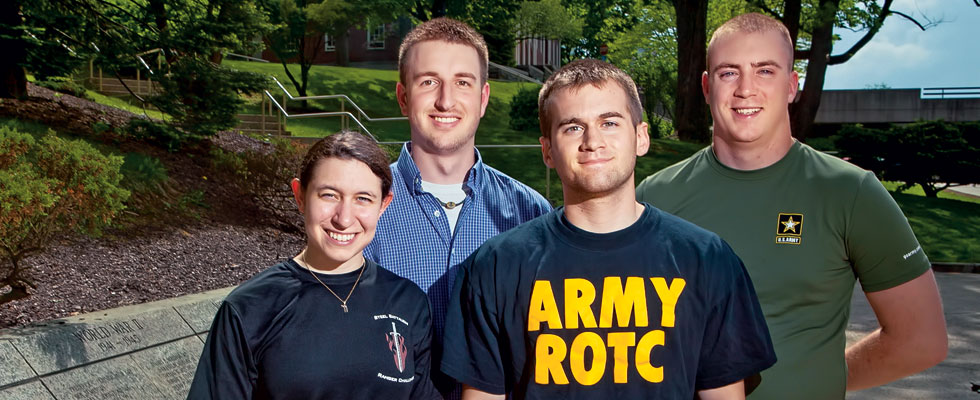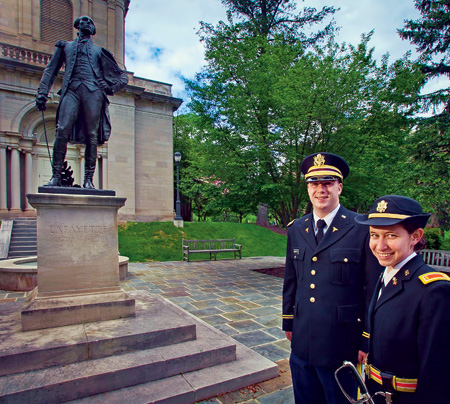Jul 8, 2014
Why I Serve
STEVEN HARRINGTON ’10 B.S., electrical and computer engineering MBA student, Tuck School of Business, Dartmouth College “I have a military tradition…

Marissa Liebman ’14 (L-R), Cord Stasolla ’15, James Patterson ’15, and Matt Argento ’14 at the Alumni Memorial Plaza in front of Oechsle Hall.
Photo by Chuck Zovko
by Kate Helm
Dangling upside down from a rope bridge slung low over the Hudson River and carrying many pounds of equipment, Marissa Liebman ’14 learned the value of selfless service. She fell in.
A teammate, also loaded down with equipment, jumped in and pulled the exhausted cadet from the frigid water.
“He drenched himself to help me, knowing there would be no time to change clothes,” Liebman says. The cadet battalion executive officer of the Army ROTC Lehigh Valley Steel Battalion, she competes on the nine-member Ranger Challenge team. They train six days a week during fall semester for a two-day competition, including physical and written tests, against other regional battalions.
“He instilled in me the importance of selfless service and sacrifice,” she says. “Since then, I’ve made it my goal to help as many of our cadets as possible, and loved every minute of it.”
During her deployment in Afghanistan last year, 1st Lt. Ann A. Rebollar ’10 displayed similar sacrificial leadership, delivering candy and snacks to boost the morale of soldiers in remote regions. “As an officer, I am there to support our soldiers,” she says.
Now serving as adjutant general at Darnall Army Medical Center at Fort Hood, Texas, Rebollar was among the first female soldiers assigned to staff and medical platoon positions as part of an Army program to advance women into new positions in combat units that were previously off limits to them.
Becoming a strong, caring, and effective leader takes “mental agility,” says James Patterson ’15, a government and law major who will serve in the Army after graduation. 1st Lt. John Knauss ’10 has it, and he credits his experience with Lafayette’s distinctive blend of engineering and the liberal arts with helping him juggle a broad array of duties as battalion logistics officer at the Army’s Ft. Leonard Wood, Mo.
“Most officers attend a military academy, which emphasizes engineering and math,” he says. “My degree in civil engineering combined with the liberal arts curriculum has made me a more well-rounded officer.”

Matt Argento ’14 and Marissa Liebman ’14 were commissioned May 18 as second lieutenants in the U.S. Army during the 95th ceremony of the Lehigh Valley Steel Battalion.
Photo by Chuck Zovko
Steven Harrington ’10 agrees. Leadership skills he developed as a first lieutenant stationed at Ft. Drum, N.Y., helped him get into Dartmouth College’s Tuck School of Business, where he is pursuing his MBA. During his deployment in Afghanistan, he called on skills he acquired as an electrical and computer engineering major at Lafayette. After a vehicle breakdown led to the deaths of two soldiers from a roadside bomb, he was tasked with implementing a new vehicle-maintenance program. Harrington remembered challenges he faced as an electrical and computer engineering major at Lafayette.
Puzzled at first about how to tackle building a circuit to control a camera mounted to a servo motor, he and his project partner devised a plan and established steps to achieve their goal. When his battalion commander in Afghanistan turned the new vehicle-maintenance protocol over to Harrington, he followed that same problem-solving process. And it helped save lives.
“Taking a difficult problem and getting a team to work together toward a solution is one of the most valuable skills you can have as an officer,” Harrington says. “We built consensus around how our new program would run. I drafted a standard operating procedure, and in just three weeks, it was in place. After each inspection, I received a report of the issues that were discovered and remedied. It was incredibly rewarding to read them.”
Passionate about breaking the stigma surrounding the mental wounds of combat, Matthew Argento ’14 aims to specialize in post-traumatic stress disorder as an Army psychologist. A Marquis Scholar, he has conducted research on PTSD at Lafayette and plans to pursue a Ph.D. in counseling or clinical psychology.
“Soldiers in the combat arms branches are almost entirely male, and they are supposed to be tough,” says Argento, who will join the Army Reserves as a medical services reserve platoon leader in Horsham, Pa., after graduation. “They aren’t supposed to cry or have nightmares. I want to break down those barriers because, much like physical wounds, mental wounds can keep soldiers from operating effectively.”
A policy studies major with a minor in geology, Liebman, too, has built a strong academic foundation for her future as a second lieutenant in the Army Signal Corps. Her independent study research using geographic information systems was a critical factor in her decision to enter the Signal Corps. She also learned how to work under pressure during the student-run 2012 election night broadcast and three Lafayette Lens segments that aired on WLVT Channel 39, the Lehigh
Valley’s PBS offiliate.
Prepared by his studies, Cord Stasolla ’15, a mechanical engineering major, passed the tough calculus and physics problems in his application for admission to the Navy’s Nuclear Propulsion Officer Candidate program. He earned his spot after an interview with Adm. John M. Richardson, director of the Naval Nuclear Propulsion Program, in Washington, D.C.
The son of a nuclear engineer, Stasolla will follow in the footsteps of David Krisovitch ’86, who served as a nuclear propulsion officer on the USS Henry M. Jackson from 1988 to 1991, before founding Microtool Precision Manufacturing, Hanover Township, Pa.
“A small uranium pellet, about the size of a thumbnail, can provide as much energy as one ton of coal,” says Stasolla, who plans to serve on a nuclear submarine after training. “Fission is a state-of-the-art process used to extract the uranium. I want to be part of it as it advances.”